Banishers: Ghosts of New Eden review
Playing Banishers: Ghosts of New Eden at the tail-end of what was a stellar January for games, I couldn’t help but be reminded of one of the first big titles I played in 2023: Forspoken. But before you draw your own conclusions from that comparison, let me elaborate. Both are open-world games with a magical bent, both are heavily narrative-led, and both showcase the kind of double-A development that cleaves close to triple-A either in terms of budget, scale, or scope. But where Forspoken fell short in almost every department to produce something that was just about fun enough to carry it over its flaws, Don’t Nod’s ghostly love story delivers a choice-driven adventure that sinks its claws in and doesn’t let go.
Fair warning: although we’ll try our best to avoid them, from this point onwards there may be spoilers.
Set in a fantastical version of the American Frontier in the year 1695, Banishers: Ghosts of New Eden sees Red mac Raith and Antea Duarte come to the titular town in response to a letter from an old friend, Charles Davenport. Something dark and terrible has befallen New Eden, but Red and Antea are Banishers, of course, professional ghost-hunters akin to Andrzej Sapkowski’s Witchers.
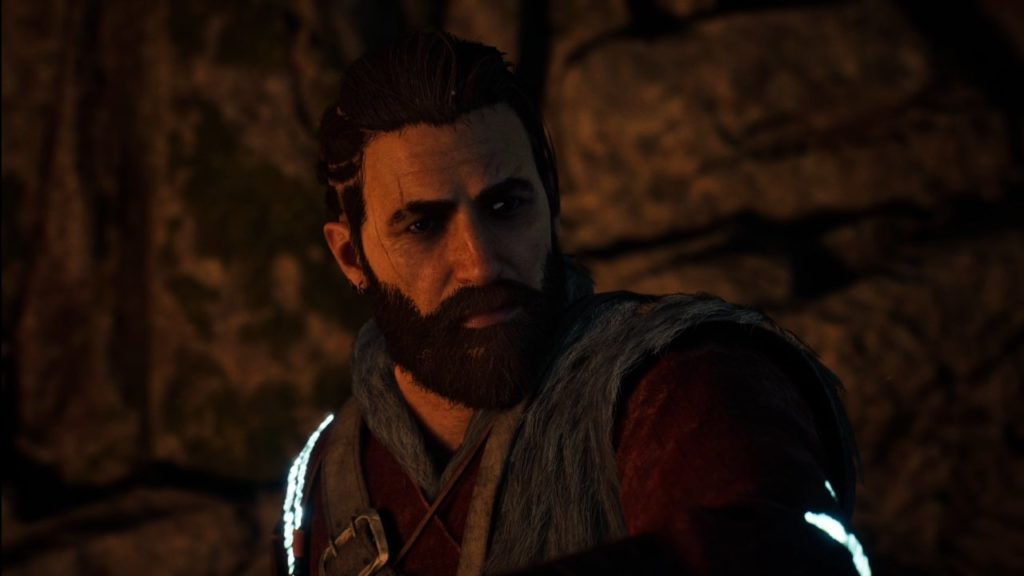
It’s difficult to talk about the story without revealing that, in an horrific turn of events, Antea is killed. Now separated from her own corpse, Antea remains bound to Red in spirit form. While he should do the professional thing and banish her, he instead vows to return her spirit to her body for one of two reasons. Either to peacefully “ascend” her ghost to the afterlife, or resurrect her using dark magic.
This single narrative choice is the backbone of Banishers: Ghosts of New Eden. In order to resurrect or ascend Antea, you’ll need to sustain her spirit and stave off a vaguely-described but very horrible “hunger” that will slowly cause her to lose her mind. If your goal is to ascend her, she can get by on much less Essence which you can get from either peacefully ascending or forcefully banishing ghosts, but if you want to resurrect her, she’ll need lots and lots of it. And you can only get it in large quantities from the living.
Don’t Nod previously played with a similar choice structure in Vampyr, wherein protagonist Jonathan Reid could choose to kill or spare the people he met to either embrace or deny his new undead nature. Banishers feels very similar, but the choices carry a lot of weight – and there’s no way to track your progress towards any of the four endings without keeping a note yourself.
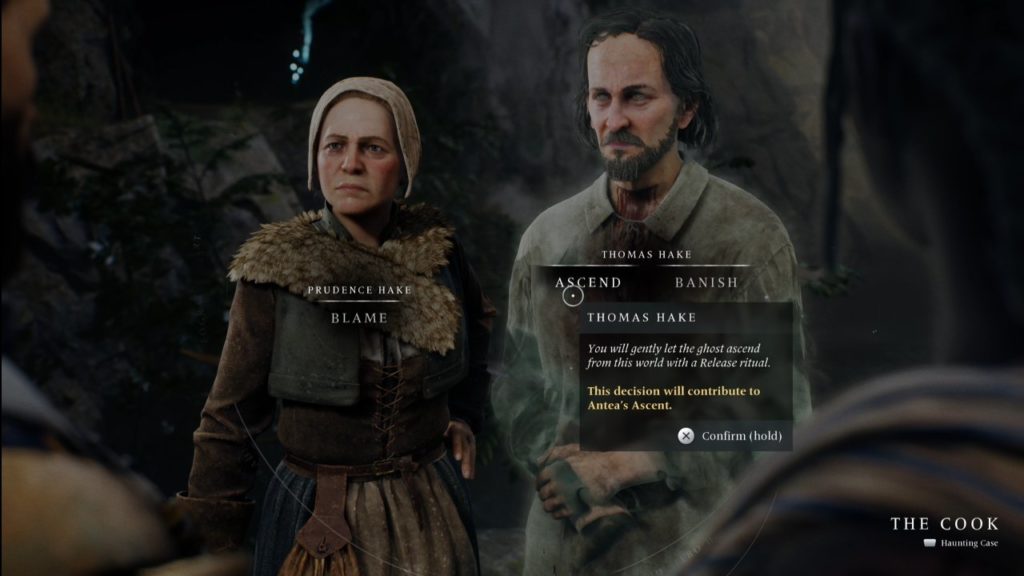
These aren’t simple decisions, either. Don’t Nod have shown themselves to have real talent when it comes to crafting choice-driven narratives, and Banishers is a solid example of this. While each of the main story beats culminates in one or more choices that will affect the world and how the narrative plays out, there are also close to twenty Haunting Cases to find around the game world, most of them optional.
Imagine, for example, finding a woman who has killed her husband and allowed her lover to take over his identity. On the surface, this is a shocking and despicable act, especially as the ghost of the murdered husband is imploring you to bring his killers to justice. Seems pretty clean cut, until you delve into the details. And this is where Banishers: Ghosts of New Eden excels: it presents each of these cases as its own separate story, with few easy choices along the way.
Should you spare a woman whose actions for the greater good have condemned settlers to death? Should you appoint yourself judge, jury and executioner to a man whose only crime was losing his mind in the wake of accidentally slaying his best friend? Knowing that these choices won’t only affect the characters in question but also Red and Antea’s future and, ultimately, the outcome of the game’s central mystery adds genuine weight to your decisions – and keeping the oath you swore isn’t always a simple matter of right or wrong.
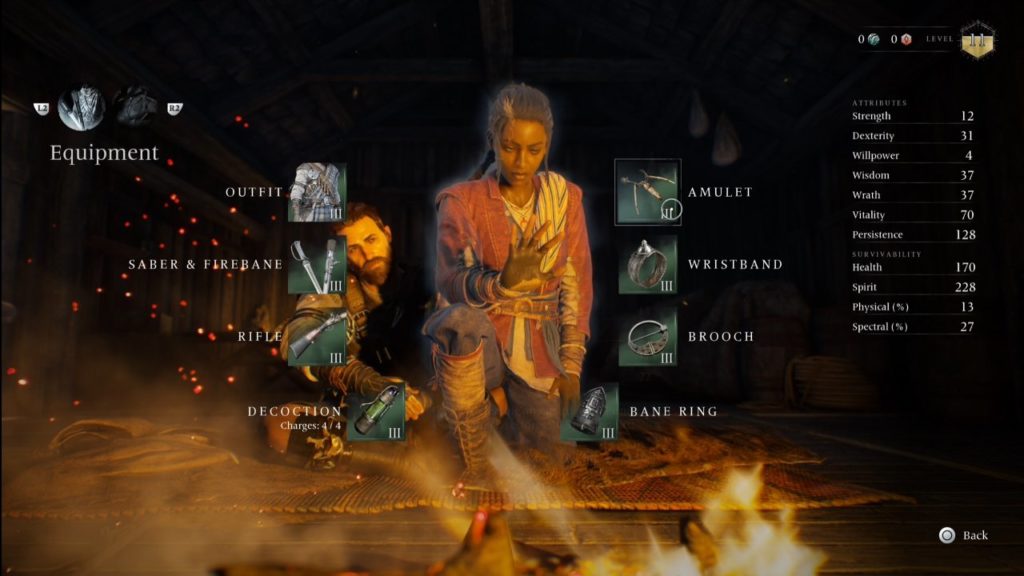
It helps that Banishers: Ghosts of New Eden has some of the best writing and voice work I’ve heard outside of a first-party Sony blockbuster. The actors behind Red and Antea in particular imbue these protagonists with such genuine pathos and empathy that I found myself watching every cutscene, and when I finally reached the culmination of all my choices after 30-odd hours I couldn’t help but choke up. It sounds like hyperbole, but Russ Bain and Amaka Okafor deserve all the plaudits possible for their performances in this tale. Red has a quiet stoicism that marries perfectly with his dry Scottish brogue, while Antea’s noble character is rocked and rattled by her own tragic fate and the implications of her choices.
The narrative plays out across the breadth of this new wildland, taking you to various towns and settlements where the displaced people of New Eden have settled in the wake of the devastating haunting of their town. You’ll settle disputes, lay to rest ancient curses, and battle malevolent spirits as both Red and Antea, who combine their strengths and otherworldly powers to overcome their obstacles.
It being an open-world RPG, Banishers litters its world with collectibles in the form of reagents for upgrading gear or performing various rituals, snippets of lore to fill in the backstory of this mythical version of our world, and loot in the form of swords, armour, rifles, amulets, brooches, and rings. While the meat of Banishers is the choice-driven narrative, the gravy is the RPG-style progression, the two-veg the sometimes uneven combat.
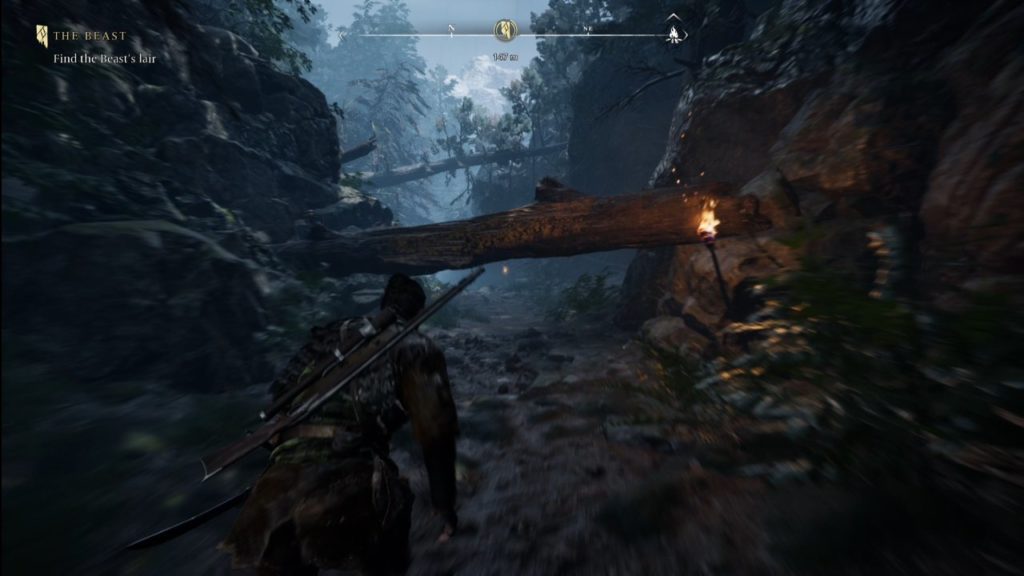
Red is armed with a sword and torch, and later a rifle, while he can call upon Antea in battle to finish his combos, or unleash her ghostly powers. At first the combat feels a little one-note, with only basic combos for Red and punches for Antea. But as you progress the story Antea unlocks new powers to use in combat, and in the world like you would in a Metroidvania game. You’ll learn new rituals to summon the dead and break curses, or magical spells to clear obstacles.
This opens up the world gradually, allowing you to find new armour, weapons, trinkets, and secrets. There are environmental puzzles, as well puzzles designed specifically to make use of the couple’s gear and powers. It encourages backtracking, returning to previous areas with new skills to finally reach that locked chest you couldn’t get to before, or open that previously-blocked path. Sadly, this highlights the game’s confounding fast-travel system which requires you to travel to campfires in order to teleport around the world, leading to a lot of unnecessary wasted time when you just want to clear up missed items and puzzles.
In fact, this is the main issue with Banishers: Ghosts of New Eden throughout: a lot of it feels kind of superfluous. For example, I took pains to find as many sets of armour and weapons as I could, but I rarely needed to change them once I found a set that looked good on Red. Playing on Normal difficulty I didn’t die once in 30 hours, not a single time, and a lot of the combat I brute-forced or got through by abusing Red’s quick rifle reload and infinite ammo. It meant that the stats the game kept telling me I had increased – but never actually explained – were all but meaningless. There are elements here that suggest build possibilities, but unless you’re playing on higher difficulties you won’t need them – and there’s simply no incentive to do so.
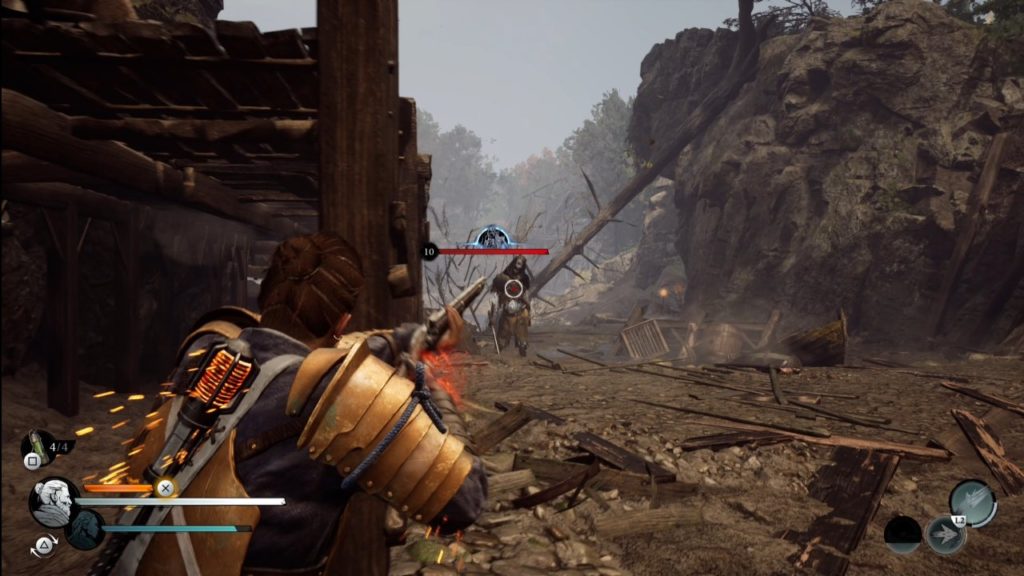
By the time you reach a point that combat should be difficult, you’ll be massively overpowered anyway. Which brings me to the skill tree, which I just stopped exploring after a while. Each of Antea’s new powers unlocks a series of increasingly large skill trees for her and Red, eventually containing scores of skills. But the system in place forces you to constantly choose between two or four skills, some of which have debuffs that render them useless against others that have no downsides.
For example, once I had a sword that healed Red after melee kills and the ability to reload his gun every time Antea landed a punch, I was done worrying. Some skills double your heavy attack damage or increase rifle damage after landing a hit, and these were just much more useful than anything that offered a debuff as penance for 30% more spirit gain or whatever.
And yet I still enjoyed the combat throughout the game, even if I did start to roll my eyes at some of the repeated voice lines or groan a little when I entered an obvious clearing and the musical cue kicked in. The fighting is weighty and impactful enough, and combing extended combos with Antea’s growing list of powers turns late-game combat into a beautiful loop of spectral violence, but it’s not the strongest element of Banishers.
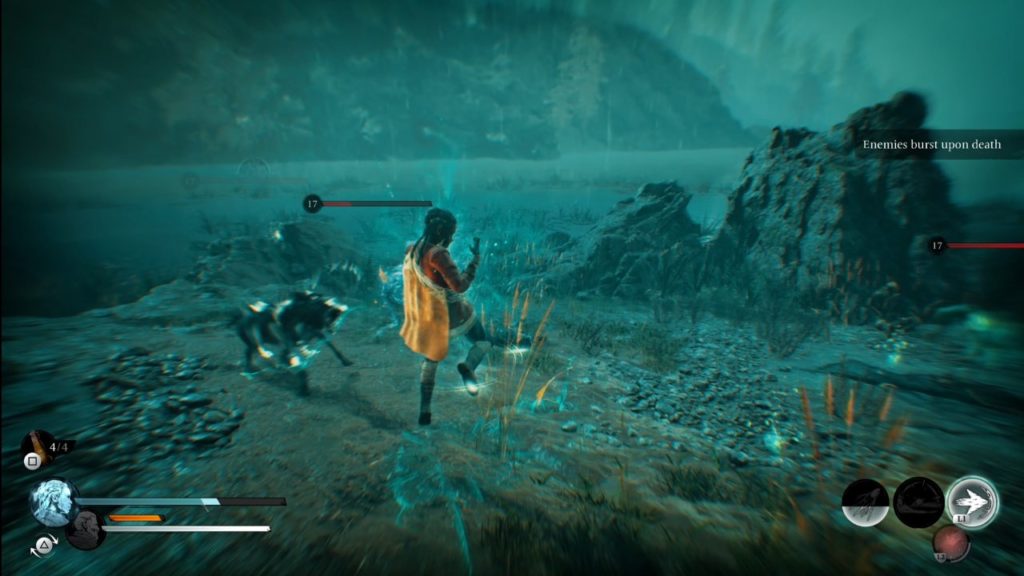
The world itself is lovely though, split between sun-dappled farmland, foreboding woods filled with ravenous wolves and the even-more ravenous dead, cliffs, lakesides, and deep, haunted mines. At times you’ll need to traverse a spectral realm to reach certain areas, and this too has its own identity and even quest elements. I finished the game with vast portions of the map still covered with fog, waiting for me to go and explore with a new power or tool.
It’s also, crucially, a full world. There’s a blocked path, locked chest, Haunting Case, side activity, spectre nest, elite spawn or puzzle to solve down every side path; every hut, cabin, or cave is worth exploring, and you’ll rarely leave anywhere empty-handed. It means you’ll want to explore the world, interact with it, and invest your time in unravelling its mysteries.
Ultimately, though, the heart of Banishers: Ghosts of New Eden is the heart-warming, heart-breaking, tragic, magic love story at its centre. Red and Antea are a wonderful pair of protagonists, whose chemistry never feels forced or uncomfortable. The tender moments they share reveal how strongly they feel for each other, and how far they’re willing to go to either remain together, or remain strong in their convictions. Either way you choose to play feels real, and that’s no mean feat.
Slight imbalances in the combat, some missing quality of life elements, and the sense that sometimes, maybe, Don’t Nod have overstretched the RPG component a little, can’t get in the way of what is a powerful, emotional, and compelling tale of love and death, and Banishers: Ghosts of New Eden shows off a side of Don’t Nod that we’ve never seen so well-lit.




